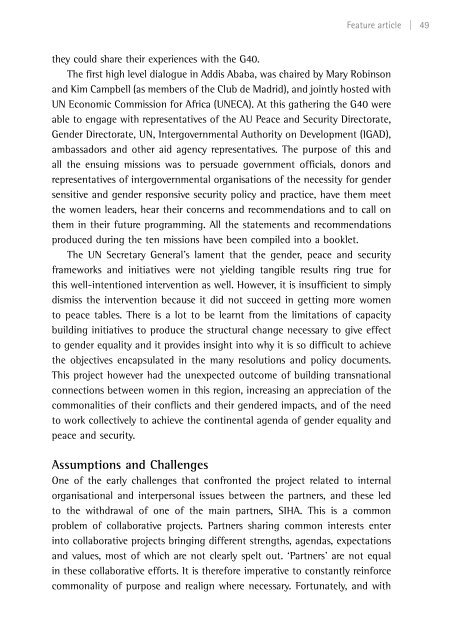Create successful ePaper yourself
Turn your PDF publications into a flip-book with our unique Google optimized e-Paper software.
Feature article | 49<br />
they could share their experiences with the G40.<br />
The first high level dialogue in Addis Ababa, was chaired by Mary Robinson<br />
<strong>and</strong> Kim Campbell (as members of the Club de Madrid), <strong>and</strong> jointly hosted with<br />
UN Economic Commission for Africa (UNECA). At this gathering the G40 were<br />
able to engage with representatives of the AU Peace <strong>and</strong> Security Directorate,<br />
Gender Directorate, UN, Intergovernmental Authority on Development (IGAD),<br />
ambassadors <strong>and</strong> other aid agency representatives. The purpose of this <strong>and</strong><br />
all the ensuing missions was to persuade government officials, donors <strong>and</strong><br />
representatives of intergovernmental organisations of the necessity for gender<br />
sensitive <strong>and</strong> gender responsive security policy <strong>and</strong> practice, have them meet<br />
the women leaders, hear their concerns <strong>and</strong> recommendations <strong>and</strong> to call on<br />
them in their future programming. All the statements <strong>and</strong> recommendations<br />
produced during the ten missions have been compiled into a booklet.<br />
The UN Secretary General’s lament that the gender, peace <strong>and</strong> security<br />
frameworks <strong>and</strong> initiatives were not yielding tangible results ring true for<br />
this well-intentioned intervention as well. However, it is insufficient to simply<br />
dismiss the intervention because it did not succeed in getting more women<br />
to peace tables. There is a lot to be learnt from the limitations of capacity<br />
building initiatives to produce the structural change necessary to give effect<br />
to gender equality <strong>and</strong> it provides insight into why it is so difficult to achieve<br />
the objectives encapsulated in the many resolutions <strong>and</strong> policy documents.<br />
This project however had the unexpected outcome of building transnational<br />
connections between women in this region, increasing an appreciation of the<br />
commonalities of their conflicts <strong>and</strong> their gendered impacts, <strong>and</strong> of the need<br />
to work collectively to achieve the continental agenda of gender equality <strong>and</strong><br />
peace <strong>and</strong> security.<br />
Assumptions <strong>and</strong> Challenges<br />
One of the early challenges that confronted the project related to internal<br />
organisational <strong>and</strong> interpersonal issues between the partners, <strong>and</strong> these led<br />
to the withdrawal of one of the main partners, SIHA. This is a common<br />
problem of collaborative projects. Partners sharing common interests enter<br />
into collaborative projects bringing different strengths, agendas, expectations<br />
<strong>and</strong> values, most of which are not clearly spelt out. ‘Partners’ are not equal<br />
in these collaborative efforts. It is therefore imperative to constantly reinforce<br />
commonality of purpose <strong>and</strong> realign where necessary. Fortunately, <strong>and</strong> with


